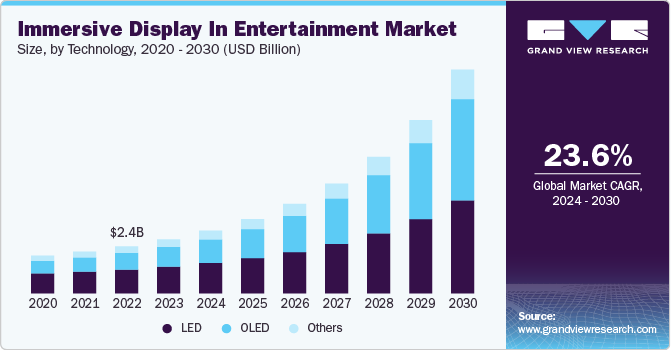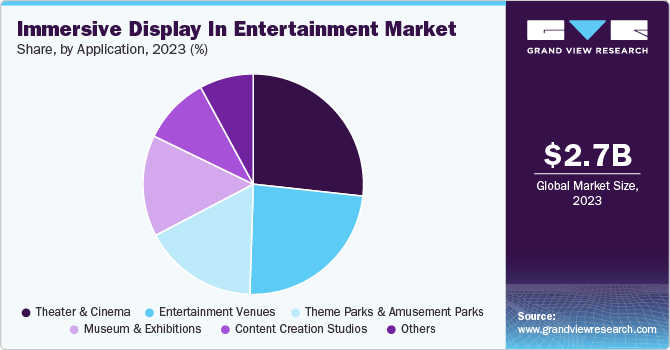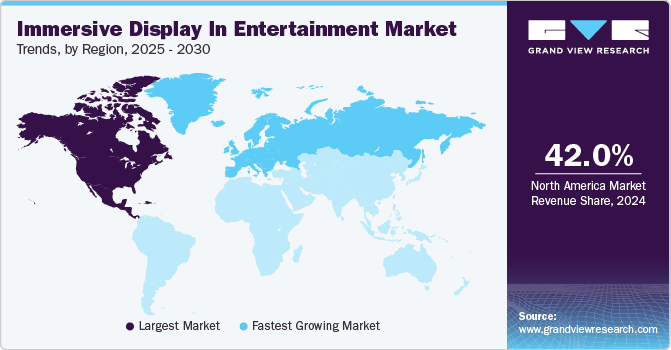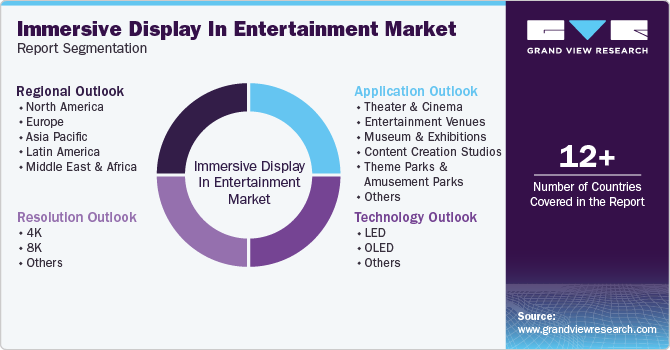
Immersive Display In Entertainment Market Size, Share & Trends Analysis Report By Technology (LED, OLED), By Resolution (4K, 8K), By Application (Theater & Cinema, Entertainment Venues, Museum & Exhibitions), By Region, And Segment Forecasts, 2025 - 2030
- Report ID: GVR-4-68040-479-5
- Number of Report Pages: 150
- Format: PDF
- Historical Range: 2018 - 2024
- Forecast Period: 2025 - 2030
- Industry: Technology
Market Size & Trends
The global immersive display in entertainment market size was estimated at USD 3,202.4 million in 2024 and is expected to grow at a CAGR of 24.7% from 2025 to 2030. The market is advancing rapidly with the increasing adoption of interactive and 3D display technologies, enhancing audience engagement and experience. Innovations such as High Dynamic Range (HDR) and projection mapping are enhancing visual quality and creating more immersive environments in live performances, and cinematic experiences, which is expected to further fuel the market growth in the coming years.

The growing demand for highly immersive entertainment experiences is a key driver of the market. Audiences are increasingly looking for more engaging, realistic, and interactive content, whether in theaters, museums, or theme parks. This shift is pushing investments in advanced display technologies such as 4K/8K resolution, 3D, and holographic displays, which offer deeper visual depth and more intense sensory engagement. As consumer expectations continue to rise, entertainment providers are turning to immersive displays to stand out and offer unique, unforgettable experiences.
The increasing use of immersive display technologies in museums and exhibitions is driving their adoption, as these technologies enable more interactive and educational experiences. By leveraging VR, AR, and projection mapping, museums are enhancing visitor engagement and transforming traditional exhibits into dynamic, participatory environments. This trend is expanding the application of immersive displays beyond traditional entertainment venues.
Additionally, the growing demand for immersive content is driving a parallel rise in the production of entertainment specifically designed for immersive displays. Content creation studios are increasingly developing films, video games, and virtual experiences in formats like 4K, 8K, VR, and 360-degree to cater to immersive theaters, VR experiences, and interactive exhibits. This surge in immersive content creation is driving broader adoption of immersive displays, as entertainment venues require specialized content to fully utilize these advanced technologies.
Moreover, the rapid advancement of display technologies, content creation tools, and sensory enhancements is changing how audiences experience entertainment, leading to greater demand for immersive experiences. Innovations in visual, auditory, and interactive aspects of entertainment are creating more realistic and engaging experiences for consumers. Projection technology has also made significant strides, with breakthroughs in laser projection systems, holographic displays, and projection mapping, widely used in theme parks, concerts, and exhibitions to transform spaces into interactive and visually stunning environments.
Technology Insights
The LED segment accounted for the largest market share, over 48%, in 2024. The integration of LED displays in VR and AR systems greatly improves visual quality, enhancing the realism and immersion of experiences. As hardware becomes more affordable and accessible, the potential for widespread adoption of VR and AR in entertainment continues to expand. This trend is further supported by advancements in content creation tools, which allow creators to craft high-quality, immersive experiences for diverse audiences, driving the growth of this segment.
The OLED segment is expected to witness the fastest CAGR of over 28% from 2025 to 2030. This growth is driven by the increasing use of OLED technology in consumer electronics, particularly smartphones, tablets, and televisions. Leading manufacturers like LG and Samsung are making significant investments in OLED production, resulting in a broader range of OLED devices available at various price points. Consumer preference for devices offering superior display quality and energy efficiency is fueling this trend. As OLED technology becomes more widespread, its production costs are expected to decline, making it more accessible to a larger audience.
Resolution Insights
The 4K segment accounted for the largest market share in 2024. As consumers increasingly seek high-quality visual experiences, there is a growing shift towards 4K displays that provide superior image clarity and immersion. With more devices incorporating 4K technology, consumer awareness and acceptance are rising, driving greater demand. Additionally, advancements in 4K content creation tools and cameras are boosting the production of 4K content, further contributing to the growth of this segment.

The 8K segment is expected to witness the fastest CAGR from 2025 to 2030. The growing technological innovations have significantly improved the performance of 8K displays, making them more attractive to both consumers and businesses. Manufacturers are investing heavily in R&D to enhance pixel density, color accuracy, and refresh rates, resulting in displays that offer exceptional visual quality. As these advancements continue, demand for 8K displays is projected to grow rapidly across various industries, including entertainment, gaming, and professional applications.
Application Insights
The theater & cinema segment in the market accounted for the largest share in 2024. This growth is driven by the rising demand for premium cinema experiences, with audiences seeking more than just standard movie screenings. Contemporary theaters are increasingly providing luxury seating, gourmet dining, and advanced audiovisual technologies to enhance the viewing experience. This trend highlights a broader shift towards creating a more immersive and comfortable environment for moviegoers, which is fueling the growth of this segment.
The content creation studios segment is anticipated to record the fastest growth from 2025 to 2030. Virtual production is transforming the operations of content creation studios, streamlining workflows and enhancing cost-effectiveness. By allowing for the real-time integration of digital environments, this technology reduces the reliance on physical sets and location shoots. Immersive displays in virtual production offer creative teams increased flexibility, enabling directors and visual effects teams to make on-the-spot adjustments. Studios are heavily investing in this technology to optimize production schedules and control budgets more efficiently, driving growth in this segment.
Regional Insights
The immersive display in the entertainment market in North America accounted for the highest revenue share of over 42% in 2024, driven by the rapid integration of VR, AR, and MR technologies across gaming, theme parks, and live events. High demand for interactive experiences, particularly in gaming and cinema, combined with a robust content creation infrastructure and tech-forward consumers, drives this growth.

U.S. Immersive Display in Entertainment Market Trends
The immersive display in the entertainment market in the U.S. accounted for a revenue share of 80% in 2024. This dominance is supported by a thriving entertainment industry and major tech companies such as Google LLC, Microsoft Corporation, and Meta Platforms, Inc. investing heavily in AR/VR. Immersive displays are increasingly used in gaming to improve player experiences, fueled by eSports popularity and VR gaming console integration. Moreover, the film industry is increasingly using immersive displays for creating more engaging cinematic experiences in IMAX and 4D theaters.
Europe Immersive Display in Entertainment Market Trends
Europe is projected to grow at a CAGR of over 25% from 2025 to 2030. This growth is propelled by the increasing adoption of AR/VR in museums, galleries, and cultural institutions for interactive learning experiences. The gaming industries in Germany, the U.K., and France are also integrating these technologies, focusing on developing innovative content and rich visual experiences.
The UK immersive display in entertainment market is expanding rapidly, driven by the growing integration of augmented reality (AR) and virtual reality (VR) in cultural attractions, live events, and film production. The UK’s strong film and television industry, including major studios like Pinewood and Warner Bros., is also leveraging immersive display technologies in virtual production, creating hyper-realistic environments using LED walls and XR stages. Furthermore, the popularity of interactive theater productions, such as Punchdrunk’s immersive performances, is pushing demand for innovative display solutions that enhance audience engagement.
Immersive display in entertainment market in Germany is being driven by advancements in high-resolution display technologies and their integration into theme parks, automotive simulation centers, and corporate training facilities. The country is a leader in engineering and precision display manufacturing, with companies like Fraunhofer and ARRI pioneering developments in microLED and laser projection technologies.
Asia-Pacific Immersive Display in Entertainment Market Trends
The immersive display in entertainment market in the Asia Pacific region is expected to grow at the highest CAGR of over 26% from 2025 to 2030. This is driven by the widespread use of advanced technologies in gaming, live events, and theme parks. The region's tech-savvy population and booming gaming industry are key drivers, with significant investments in VR/AR entertainment centers and immersive attractions. Immersive displays are also gaining traction in local film production and broadcasting.
The China immersive display in entertainment market in China is experiencing rapid growth, primarily driven by the government's push for digital transformation and the integration of advanced display technologies in cultural and entertainment sectors. The country is heavily investing in LED and OLED-based immersive displays for large-scale entertainment venues such as theme parks, museums, and cinemas. Additionally, China’s gaming and e-sports industry is fueling the demand for high-resolution VR and AR displays, with major players like Tencent and NetEase leading the innovation in immersive content. The rise of AI-driven interactive entertainment and metaverse initiatives is also playing a crucial role in shaping the market, with platforms such as Baidu's XiRang and ByteDance’s VR division advancing new immersive experiences.
Immersive display in entertainment market in Japan is being driven by the country’s deep-rooted gaming culture and its leadership in animation, virtual idols, and mixed reality (MR) experiences. The gaming industry is a key adopter of immersive display technologies, with companies like Sony, Nintendo, and Capcom integrating high-resolution VR/AR solutions into their gaming ecosystems. Theme parks, such as Universal Studios Japan, are incorporating cutting-edge projection mapping and interactive displays to enhance visitor engagement.
Key Immersive Display In Entertainment Company Insights
Some of the key players operating in the market include Barco N.V., LG Electronics and Sony Corporation, among others.
-
Barco N.V. specializes in advanced display and projection technologies. Operating through three business segments, namely entertainment, enterprise, and healthcare; the company offers a wide variety of products categorized under projection, cinema systems, video walls, medical displays, immersive systems, and image processing. The entertainment segment includes two key business units, namely Cinema, which provides a comprehensive range of laser and lamp-based projectors along with audio solutions, and The Immersive Experience, which focuses on tailored solutions for large venues and themed entertainment applications, such as museums and theme parks.
-
LG Electronics Inc. is a technology company engaged in the production and sales of a wide variety of consumer electronics and home appliances. The company’s product range includes TVs, computer monitors, laptops, audio and personal care gadgets, refrigeration units, video devices, laundry machines, dish cleaning appliances, water purification systems, air cooling equipment, and floor care machinery, among others. The company caters to the immersive display market through its MAGNIT series, which features high-resolution Micro LED displays.
Leyard and Prysm Systems, Inc. are some of the emerging market participants in the market.
-
Leyard is a provider of LED video displays, offering a wide range of indoor and outdoor solutions, including LED video walls, narrow pixel pitch displays, and LCD products. The company specializes in immersive display technologies for entertainment markets. The company has production facilities in Europe but provides local support for design, installation, and maintenance. The company’s products are used in various applications, including control rooms, automotive design centers, conference rooms, shopping centers, stadiums, cultural events, railways, and television studios.
-
Prysm Systems, Inc. specializes in laser-powered phosphor displays designed for various collaborative environments. The company primarily offers solutions for applications, such as meetings, training, onboarding, and product development, requiring effective communication tools. The company’s product portfolio includes advanced LPD and LCD screens. Key features of the company’s solutions include digital whiteboarding, onscreen annotation, co-browsing, device sharing, and comprehensive meeting management functionalities. With a focus on innovation, the company is well-positioned in the immersive display market, catering to diverse client needs.
Key Immersive Display In Entertainment Companies:
The following are the leading companies in the immersive display in entertainment market. These companies collectively hold the largest market share and dictate industry trends.
- Barco N.V.
- Christie Digital Systems USA, Inc.
- Disguise Technologies Limited
- Leyard
- LG Electronics
- Panasonic Holdings Corporation
- Prysm Systems, Inc.
- ROE Visual
- Samsung Electronics Co., Ltd.
- Sharp Corporation
- Shenzhen INFiLED Electronics Co., Ltd.
- Sony Corporation
Recent Developments
-
In January 2025, at CES, Samsung Electronics unveiled Samsung Vision AI, designed to deliver personalized, AI-powered screen experiences integrated across its 2025 lineup, including Neo QLED, OLED, QLED, and The Frame TVs. Samsung Vision AI offers features like Click to Search, Live Translate, and Generative Wallpaper, enhancing entertainment and personalization.
-
In November 2024, Leyard officially launched Phase I of its self-developed full-process High-Level MIP (Micro LED packaging technology) line at its Leadstar facility in Wuxi, Jiangsu. This production line aims to drive LED display industrial chain forward, accelerate cost reduction and efficiency, and promote large-scale application of Micro LED display products.
-
In January 2024, Sony Corporation announced the development of a spatial content creation system that features a high-quality XR head-mounted display and specialized controllers designed for interaction with 3D objects. This innovative system aims to enhance the creation and manipulation of spatial content, providing users with an immersive experience that bridges the gap between digital and physical environments. By integrating advanced technologies, Sony seeks to empower creators in variousfields, including gaming, education, and design, to produce more engaging and interactive content.
Immersive Display In Entertainment Market Report Scope
|
Report Attribute |
Details |
|
Market size value in 2025 |
USD 3,801.3 million |
|
Revenue forecast in 2030 |
USD 11,449.1 million |
|
Growth rate |
CAGR of 24.7% from 2025 to 2030 |
|
Actual data |
2018 - 2024 |
|
Forecast period |
2025 - 2030 |
|
Quantitative units |
Revenue in USD Million and CAGR from 2025 to 2030 |
|
Report Technology |
Revenue forecast, company ranking, competitive landscape, growth factors, and trends |
|
Segments covered |
Technology, resolution, application, regional |
|
Regional scope |
North America; Europe; Asia Pacific; Latin America; and Middle East & Africa |
|
Country scope |
U.S.; Canada; Mexico; U.K.; Germany; France; Italy; Spain; China; Australia; Japan; India; South Korea; Brazil; South Africa; Saudi Arabia. |
|
Key companies profiled |
Barco N.V.; Christie Digital Systems USA; Inc.; Disguise Technologies Limited; Leyard; LG Electronics; Panasonic Holdings Corporation; Prysm Systems, Inc.; ROE Visual; Samsung Electronics Co. Ltd.; Sharp Corporation; Shenzhen INFiLED Electronics Co., Ltd.; and Sony Corporation |
|
Customization scope |
Free report customization (equivalent to up to 8 analyst’s working days) with purchase. Addition or alteration to country, regional & segment scope. |
|
Pricing and purchase options |
Avail customized purchase options to meet your exact research needs. Explore purchase options |
Global Immersive Display In Entertainment Market Report Segmentation
This report forecasts revenue growth at global, regional, and country levels and provides an analysis of the latest industry trends in each of the sub-segments from 2018 to 2030. For this study, Grand View Research has segmented the global immersive display in entertainment market report based on technology, resolution, application, and region:

-
Technology Outlook (Revenue, USD Million, 2018 - 2030)
-
LED
-
OLED
-
Others
-
-
Resolution Outlook (Revenue, USD Million, 2018 - 2030)
-
4K
-
8K
-
Others
-
-
Application Outlook (Revenue, USD Million, 2018 - 2030)
-
Theater & Cinema
-
Entertainment Venues
-
Museum & Exhibitions
-
Content Creation Studios
-
Theme Parks & Amusement Parks
-
Others
-
-
Regional Outlook (Revenue, USD Million, 2018 - 2030)
-
North America
-
U.S.
-
Canada
-
Mexico
-
-
Europe
-
UK
-
Germany
-
France
-
Italy
-
Spain
-
-
Asia Pacific
-
China
-
Australia
-
Japan
-
India
-
South Korea
-
-
Latin America
-
Brazil
-
-
Middle East & Africa
-
South Africa
-
Saudi Arabia
-
-
Frequently Asked Questions About This Report
b. The global immersive display in entertainment market size was estimated at USD 3,202.4 million in 2024 and is expected to reach USD 3,801.3 million in 2025.
b. The global immersive display in entertainment market is expected to grow at a compound annual growth rate of 24.7% from 2025 to 2030 to reach USD 11,449.1 million by 2030.
b. The market is advancing rapidly with the increasing adoption of interactive and 3D display technologies, enhancing audience engagement and experience. Innovations such as High Dynamic Range (HDR) and projection mapping are enhancing visual quality and creating more immersive environments in live performances, and cinematic experiences, which is expected to further fuel the market growth in the coming years.
b. The LED segment accounted for the largest market share of over 48% in 2024. The incorporation of LED displays in VR and AR setups significantly enhances visual quality, making experiences more realistic and engaging. As hardware becomes more affordable and accessible, the potential for widespread adoption of VR and AR in entertainment continues to grow. This trend is further supported by advancements in content creation tools, enabling creators to develop high-quality immersive experiences that cater to diverse audiences, thereby driving the segmental growth
b. Some of the key players operating in the immersive display in entertainment market include Barco, Christie Digital Systems USA, Inc., Disguise Technologies Limited, Leyard, LG Electronics, Panasonic Holdings Corporation, Prysm Systems, Inc., ROE Visual, Samsung Electronics Co., Ltd., Sharp Corporation, Shenzhen INFiLED Electronics Co., Ltd., and Sony Corporation.
We are committed towards customer satisfaction, and quality service.
"The quality of research they have done for us has been excellent."




